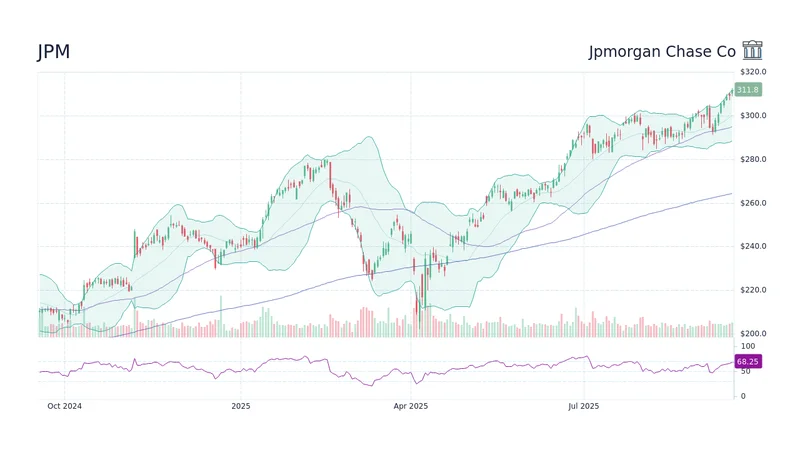Article Directory
So, you want to know about JPMorgan Chase’s big earnings report. Great. Me too. But to get there, I first had to wade through a novel-length treatise on NBCUniversal’s cookie policy and then stare at a digital brick wall telling me “Access to this page has been denied.”
This is it. This is the modern information economy in a nutshell. It’s like trying to find a single, important document in a hoarder's house. You know it’s in there, somewhere beneath the stacks of old newspapers and broken appliances, but first you have to sign a waiver, agree to be tracked by 17 different data brokers, and then discover the front door is jammed anyway.
The actual news? JPM beat expectations. Shocker. They printed money. Again. Diluted earnings per share of $5.07 when Wall Street’s geniuses predicted $4.85. Revenue of $46.43 billion against an expected $45.47 billion. The stock is up over 30% for the year. Champagne corks should be flying, right? Well, not exactly. The stock dipped a bit in pre-market trading.
It’s just… perfect. The biggest bank in the country smashes its earnings, and the first reaction is a shrug and a slight downturn. It’s a market that makes no sense, reported through a media ecosystem that’s fundamentally broken. But don’t worry, they got your data while you were trying to figure it all out.
The Dimon Two-Step
Let's talk about Jamie Dimon. The man is a master. He gets on the horn and delivers a quote so perfectly balanced it could walk a tightrope. He says, “the U.S. economy generally remained resilient.” Translation: “Things are great, our numbers prove it, please continue to give us your money.”
But then comes the pivot, the classic Dimon two-step. He immediately follows up with a laundry list of boogeymen: “complex geopolitical conditions, tariffs and trade uncertainty, elevated asset prices and the risk of sticky inflation.” Translation: “But if the whole thing blows up, don’t you dare come crying to me. I warned you.”
This is a bad sign. No, "bad" doesn't cover it—this is the financial equivalent of your pilot coming on the intercom to say the flight is going smoothly but to please review the emergency landing procedures. Why is the CEO of a bank that just crushed its numbers so eager to tell us how terrible everything could become? What does he see that the rest of us don’t? Or is this just the standard-issue corporate ass-covering that’s become the only language these guys speak?

The numbers look good on paper. Banking & Wealth Management revenue is up 9%. Great. But that’s driven by “higher net interest income.” In other words, they’re making more money off the spread between what they pay you for your deposits (next to nothing) and what they charge for loans (a hell of a lot). This isn't some grand feat of economic innovation; it’s just the oldest trick in the banking book, amplified by a weird, uncertain economy. It ain't rocket science.
A System Drowning in Noise
I keep coming back to that cookie policy. It was pages long. It talked about Flash cookies, ETags, web beacons, and software development kits. It’s a mountain of technical and legal jargon designed for one purpose: to make you, the user, give up and click “Accept All.” It’s not meant to be understood. It's a tool of obfuscation.
And isn't that exactly what we’re looking at with this whole earnings song and dance?
We get a headline number that says “Good!” Then the stock ticks down, which says “Bad?” Then the CEO says things are both good and bad. Wall Street analysts, god bless their hearts, call the stock a “Moderate Buy” with a price target that suggests a measly 7% upside. A 7% potential upside on the biggest bank in America after a monster quarter? Give me a break. It feels like they're just throwing darts at a board.
I can just picture some 24-year-old analyst, eyes burning from the pre-dawn glow of a terminal, trying to write a report that makes sense of this. The numbers are green, the stock is red, the CEO is a doomsday prophet, and his ad blocker just broke the news site he was trying to read. Offcourse he's confused. We all are.
The real story isn’t that JPM made a lot of money. That’s not news; that’s the baseline. The real story is that the signal is completely lost in the noise. The information is there, but it’s wrapped in so many layers of corporate-speak, market irrationality, and broken technology that it might as well not exist at all. They expect us to make sense of it all, and honestly...
So, What's the Point Anymore?
At the end of the day, we’re left with a simple, infuriating truth: the game is rigged. Not in a cinematic, backroom-deals kind of way, but in a far more boring and soul-crushing one. It’s rigged by complexity. It’s rigged by a firehose of contradictory information. It’s rigged by systems designed to confuse and overwhelm you until you just give up and let the algorithms take the wheel. JPMorgan Chase is doing great. Or maybe it’s on the verge of a cliff. Who the hell knows? And by the time you figure it out, they’ve already collected your data and sold it to the highest bidder.
